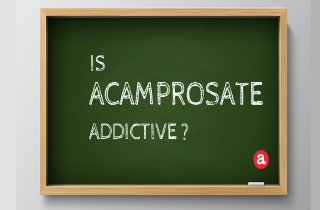No. Acamprosate is not addictive.
Actually, it’s a fairly safe medication and appears to have no potential for abuse. It is prescribed to help people in the post-withdrawal period after alcohol detox manage cravings. Even patients who have been taking it for a longer period of time do not develop tolerance to acamprosate or experience physical dependence. But what is acamprosate made of and does acamprosate really work? We review these questions here and invite your questions and comments at the end.
What is acamprosate used for?
Acamprosate is a relatively new drug developed for treatment of alcohol addiction. Scientists think it works by reducing the intensity of protracted withdrawal symptoms and decreasing alcohol cravings. It works to modulate brain centers which are thrown out of balance after chronic or heavy drinking. People who used acamprosate in combination with psychotherapy and/or behavioral therapies claim to “lose interest in alcohol” after regular dosing. Although acamprosate’s mechanism of action is not fully understood, it has been approved by the U.S. Food and Drug Administration and is useful for post-withdrawal maintenance of alcohol abstinence in patients who have already gone through alcohol detox.
What is acamprosate made of?
Acamprosate calcium is also known by the brand name Campral. It’s a synthetic compound with a chemical structure similar to that of the endogenous amino acid homotaurine. The chemical name of acamprosate calcium is calcium acetylaminopropane sulfonate and it is a white, odorless substance. The medication is supplied in an enteric coated tablet form, intended for oral administration only. Acamprosate is a substance approved by the FDA and is not listed as a controlled substance, mainly because it shows no abuse potential and has no known addictive properties.
How addictive is acamprosate?
Acamprosate is not addictive at all.
This medication works by modulating and normalizing brain activity in people who have used alcohol excessively and for a longer period of time. Researchers suspect that acamprosate is effective in the glutamate and gamma-aminobutyric acid (GABA) neurotransmitter system, but the mechanism of action is yet to be clearly established.
Acamprosate for treatment of alcohol dependence
How does acamprosate work in the brain? First, lets explain alcohol dependence to better understand how acamprosate works as a medicine.
When drinking habits become unhealthy and dangerous, or a person starts drinking too often or too much, it can lead to alcohol dependence. When you are physically dependent on alcohol, your brain adapts to the depressant effect of alcohol by “speeding up”. This is why you go through withdrawal when you stop drinking: it takes time for the “faster” processes in the brain to slow down again. Furthermore, alcoholism indicates a physical and/or mental addiction to alcohol, and this includes strong cravings for alcohol.
A person who has become dependent on alcohol will most likely experience withdrawal symptoms upon cessation of alcohol consumption. Acamprosate cannot assist the withdrawal symptoms that occur during alcohol detox, but can help greatly in the post-withdrawal period. After detox, staying sober is in the point of focus. Acamprosate treats the strong cravings for alcohol that if left untreated can easily lead to relapse.
Acamprosate use in alcohol recovery
There is a substantial clinical evidence that acamprosate increases abstinence rates in recently detoxified alcoholics and that this effect persists throughout one year of follow-up. However, it is highly advised that you take acamprosate IN ADDITION TO seeking psychotherapy, group counseling and support programs. While acamprosate can help you refrain from drinking, in order to lay the foundation of a full recovery, you need to work on the psycho-emotional issues which compel use. Improving areas of your life, adapting new coping strategies, and address triggers for drinking are all essential aspects of any program of recovery.
Acamprosate and addiction questions
Now, after reading the article, we welcome your questions and comments. Please post them in the section below and we’ll do our best to provide you with a personal and prompt answer.









Related Posts